Editorial
Greetings from MASSA !
2020 had given us a tumultuous start to the decade. As 2020 comes to a close we see that the Covid-19 pandemic remains a disruptive force for every market including Malaysia. However, along with this disruption we see a myriad of opportunities that may be beneficial to enterprising businesses as well.
MASSA hopes to bring to members attention, events and programmes that can be informative and useful to help you and your businesses take advantage of the initiatives and opportunities that come available.
In this newsletter, we report on two webinars organised by MITI & MATRADE. They were (1) “Malaysia & Argentina: Strengthening Bilateral Trade & Investment in the New Normal” and (2) “Reconnect: Hong Kong-Malaysia Partnership” jointly organised by the Commerce and Economic Development Bureau of the Hong Kong SAR Government and the Ministry of International Trade and Industry (MITI) Malaysia. We have distilled some key takeaways which may be helpful to catalyse your business interests abroad.
Our appreciation is extended to EXIM Bank for their insightful article on “Building a Better Economy through Greater Trade Relations”. We also thank MIDA for their article on the Malaysia Lighthouse Program, which is an innovative initiative that incentivises digitalisation for manufacturers. In lieu of the successful and momentous APEC Malaysia 2020, which culminated in the signing of the Putrajaya Vision 2040, we have an article to inform our membership on APEC, and the opportunities and benefits for investment, partnership and business that come with it.
We can look forward to 2021 with RCEP progressively taking effect and, the fruits of APEC 2020 coming onstream, especially Putrajaya Vision 2040 influencing the outlook for the coming years. Furthermore, on the calendar of 2021 is EXPO 2020 Dubai, which will be hosted at the Dubai Exhibition Centre, UAE from 1 October 2021 to 31 March 2022. The EXPO will host the world for 6 months, including Malaysia at the Malaysia Pavilion.
An event in the near horizon is MASSA postponed webinar on “Business Opportunities in the Republic of Guinea”. We are pleased to inform our members that steps have been taken to arrange for this webinar to be held in Q1 2021, so stay tuned for further news to come!
Finally, as we close 2020, we want to thank our members, contributors, and collaborators for their continued support throughout this year. MASSA remains committed to present to members, trade and investment leads from the South-South countries, especially in light of the pandemic ushering an increased need for collaborative efforts at all levels and on the digital platform. To that end, several events to keep an eye out for are in the works. We look forward to your participation in these pro-business, digital-forward events in the coming year.
We wish all members and readers, a happy new year 2021, stay safe and keep well in these Covid-19 days.
Thank you.
Ng Su Fun
Editorial MASSA
President’s Message

Tan Sri Azman Hashim
President
MASSA
Greetings and Best Wishes for 2021!
2020 was an extraordinarily unprecedented year of trials and challenges. The Covid-19 pandemic curtailed the global economy. The swift downward economic spiral as a result of containment measures created demand and supply shocks which added to the challenges of losing lives and livelihoods. It has been 10 months since the pandemic was declared. Governments across the globe resorted to expansive stimulus measures to contain the economic fallout from further deterioration.
The Malaysian economy contracted by 8.3% in the first half of 2020 with a decline of 17.1% in the second quarter. For the year 2020, our economy is expected to contract by 4.5%. The stimulus packages effected by our Government namely, Prihatin, PrihatinPKS+, the National Economic Recovery Plan (Penjana) and KITA Prihatin, totalling RM305 billion is anticipated to help our economy recover with its spillover effects into 2021.
GDP growth for 2021 is projected to rebound to between 6.5% and 7.5%. This will be supported by strong economic fundamentals from a well diversified economy. However, this favourable outlook will hinge on 2 major factors, i.e. the successful containment of the pandemic and a sustained recovery in external demand.
This pandemic accelerated the push for businesses to go digital. This move online was imperative for businesses to stay afloat. There was an acceleration of learning, relearning, adapting and innovating with the pivot to the online world through the use of technology. In many ways 2020 has been a reset year. We must use this momentum to drive lasting change in the way we do business and the way we will live.
I would like to congratulate our Government for two very significant outcomes in the recent months, achieved inspite of unprecedented challenges the region faced amidst the Covid-19 pandemic. The signing of the RCEP on 15 November 2020 by our Prime Minister, YAB Muhyiddin bin Haji Muhammad Yassin together with 14 other Heads of Government was a very significant step to integrate three major economic blocs of Asean, Northeast Asia and Australia and New Zealand, bringing major benefits to all member countries. This RCEP represents the world’s largest Free Trade Agreement, covering 30% of the world’s gross domestic product and world population, and 27% of the world’s total trade value in 2019. Since the beginning of the initiation for the formation of the RCEP, the East Asia Business Council (EABC) represented the views of the Private Sector and EABC actively promoted and presented their recommendations at each and every annual meeting of the Leaders of ASEAN and the Plus 3 (China, Japan, Korea). EABC (Malaysia Chapter) of which I am Chairman is a consistent and persistent supporter of the RCEP.
Our Government hosted the 27th APEC leader’s meeting in 20 November 2020, through a first ever virtual meeting platform, chaired by our Prime Minister. The leaders of the 21 APEC member countries successfully concluded the meeting with the issuance of 2 landmark documents, namely the Leader’s Kuala Lumpur Declaration and the launch of the APEC Putrajaya Vision 2040. The 21 leaders pledged to work together to support priorities to combat and mitigate the impact of COVID-19, implore the narrative of trade and investments, strive for an inclusive economic participation through digital economy and technology, drive innovative and inclusive sustainability whilst strengthening stakeholder engagement.
The APEC Putrajaya Vision 2040 will chart the future of the region, envisioning an open dynamic, resilient and peaceful Asia-Pacific community by 2040 for the prosperity of all the people and future generations. Just like the Bogor Goals 2020 before it, the Putrajaya Vision 2040 will be a feature at every annual Leaders’ Meetings of APEC until 2040. A great image for Putrajaya and Malaysia!
These two events will position Malaysia to be at the centre of a dynamic economic region that is expected to grow exponentially. As private sector businesses, we must grasp this opportunity to strengthen our export competitiveness and efficiency and enlarge our market share in all our lines of business.
Going forward we can expect challenging economic headwinds in 2021 as we endeavour to recover from the economic crisis of 2020. Let us all move forward together with a renewed mindset and embrace the transition to adapt lifelong learning, unlearning and be receptive to new ways of developing and undertaking new businesses.
I appreciate the continuing support and cooperation of all members, especially my fellow Executive Committee members with your attendance and participation at our regular meetings and your generous contributions.
I also wish to thank all our supporters who have contributed valuable and insightful articles to our Newsletter for 2020.
I wish everyone a happy, healthy and successful 2021.
Tan Sri Azman Hashim
President
MASSA
Diary of Events
(1) 29 June 2020
– MASSA 29th Annual General Meeting
Tan Sri Azman Hashim, President of MASSA convened the Twenty-Ninth (29th) Annual General Meeting (AGM) of MASSA at the Boardroom, 26th Floor, Bangunan Ambank Group, Jalan Raja Chulan, Kuala Lumpur.
In order to comply with the Government’s and/or relevant authorities’ directives and guidelines on public gatherings, meetings and events, arising from the measures to combat the spread of the COVID-19 pandemic during the Recovery Movement Control Order, the MASSA 29th AGM was convened via a hybrid of in-person as well as virtual participation.
The President of MASSA welcomed members and Committee members and proceed with the business of the AGM.
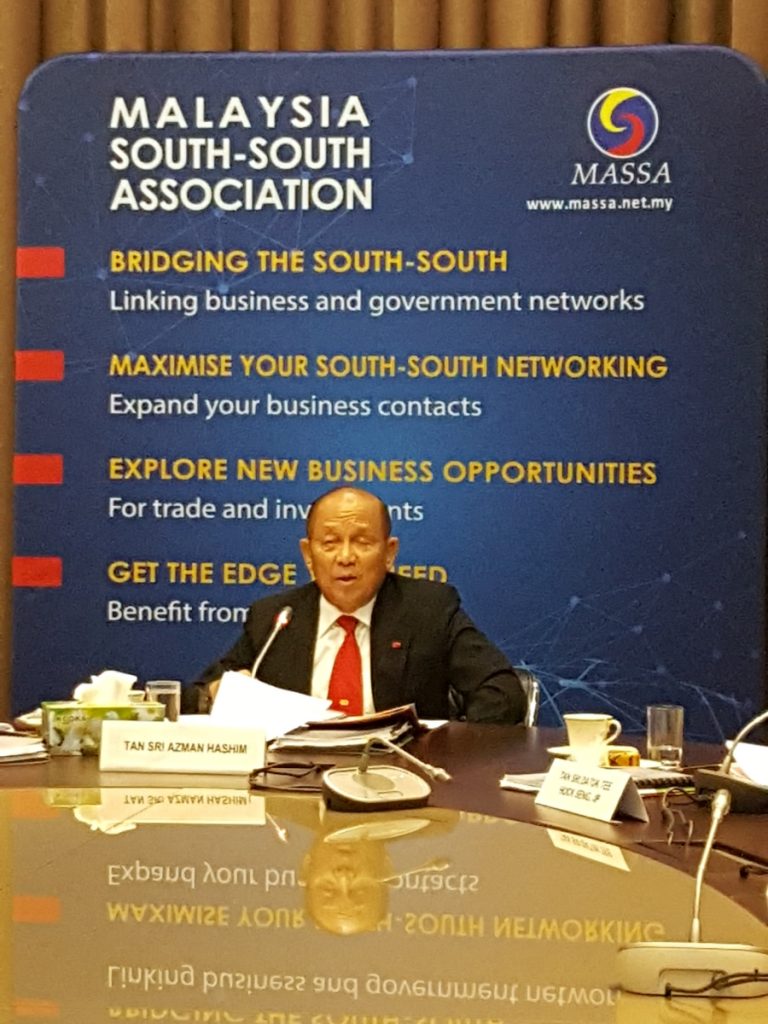
Tan Sri Azman Hashim, President of MASSA chairing the MASSA 29th Annual General Meeting on 29 June 2020
Tan Sri Azman Hashim delivered his address and the meeting proceeded to unanimously adopt the Annual Report and the audited accounts of the Association for the year ended 31st December 2019.
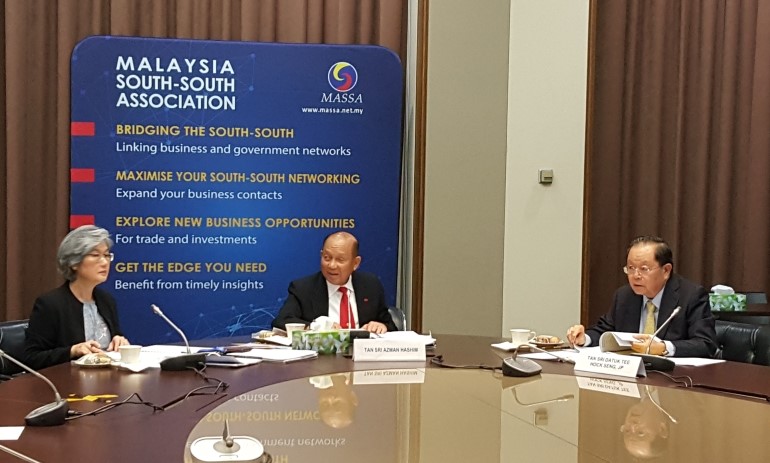
(left to right) Ms Ng Su Fun, Executive Secretary MASSA, Tan Sri Azman Hashim, President MASSA and Tan Sri Datuk Tee Hock Seng, JP, Honorary Treasurer MASSA attending the 29th AGM of MASSA
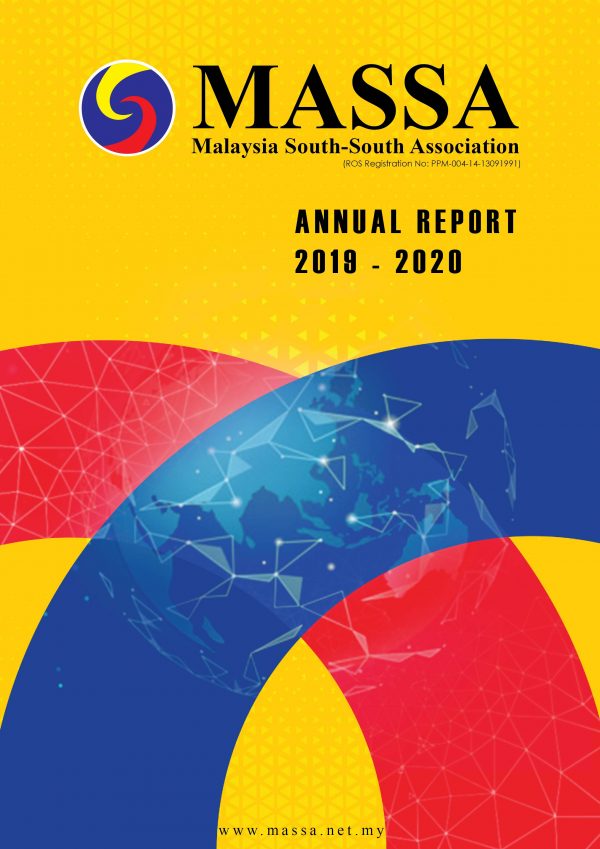
Cover of MASSA Annual Report 2019 – 2020
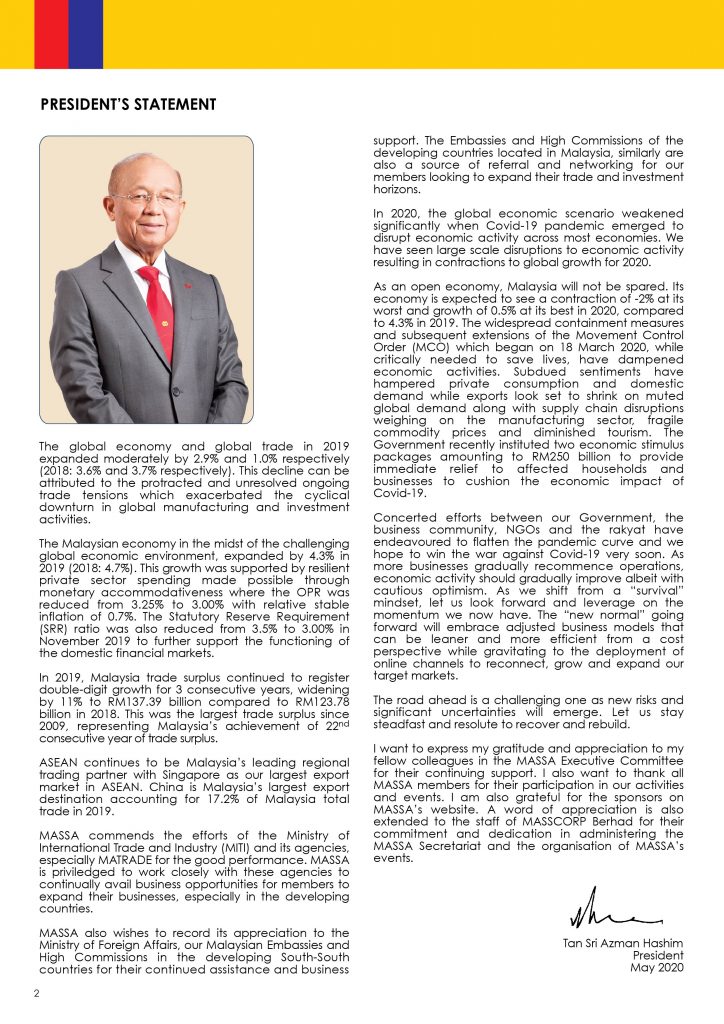
President’s Statement in the MASSA Annual Report 2019 – 2020
The President thanked the Executive Committee and Office Bearers for their continuing support and MASSA members for their participation in MASSA events and activities.
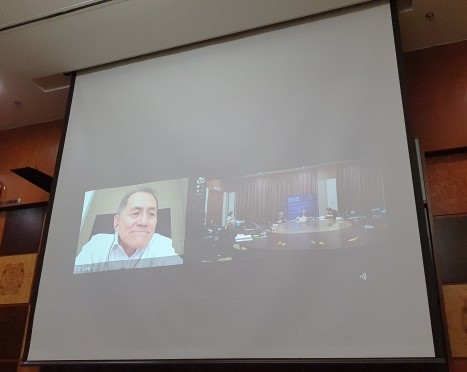
Datuk T Y Lee, Honorary Secretary MASSA attending the MASSA AGM online
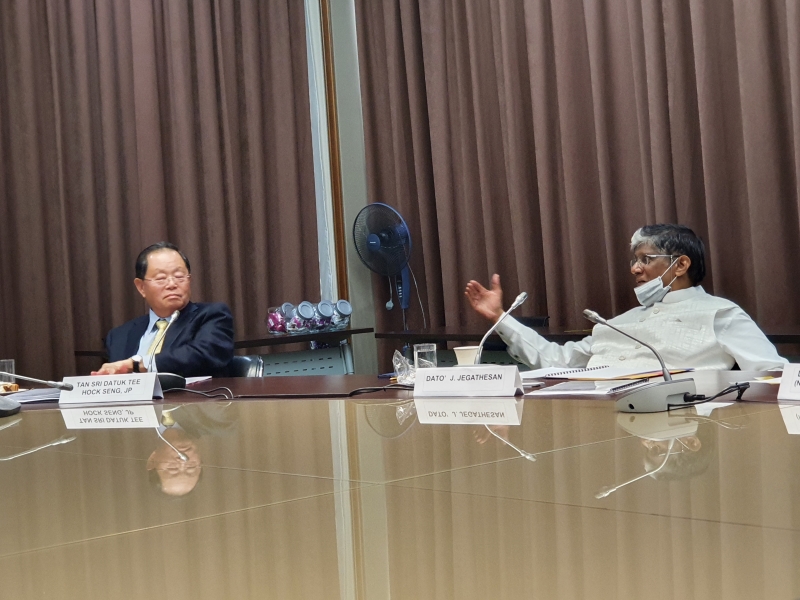
(left) Tan Sri Datuk Tee Hock Seng, JP and (right) Dato’ J. Jegathesan
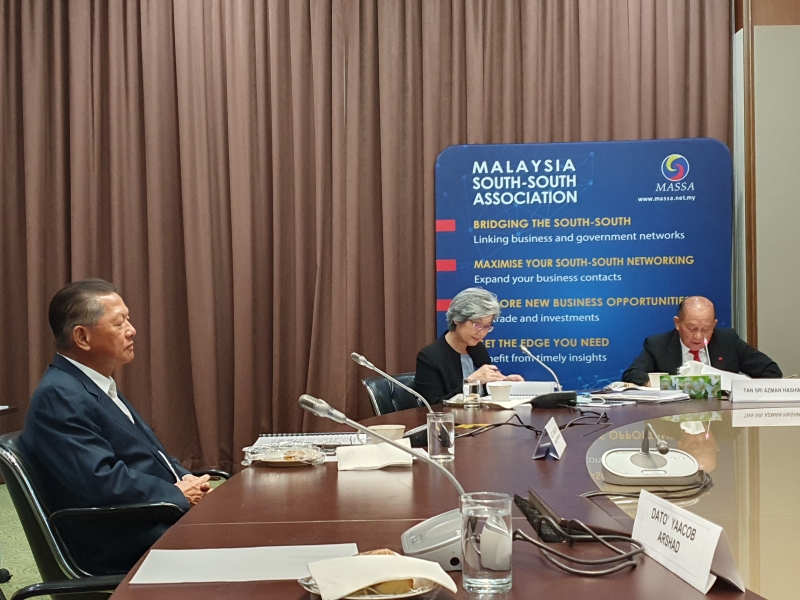
(left to right) Dato’ Kuah Lai Huat, Ms Ng Su Fun and Tan Sri Azman Hashim
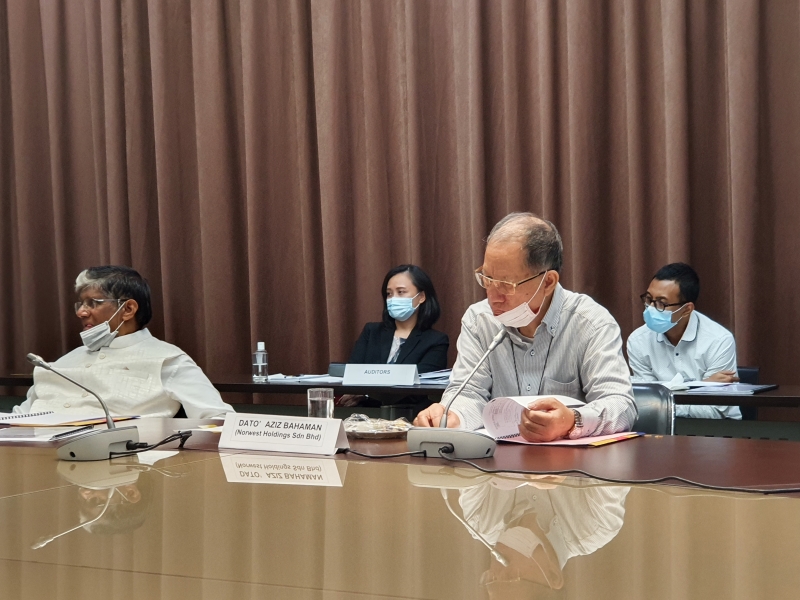
(left) Dato’ J. Jegathesan and (right) Dato’ Aziz Bahaman
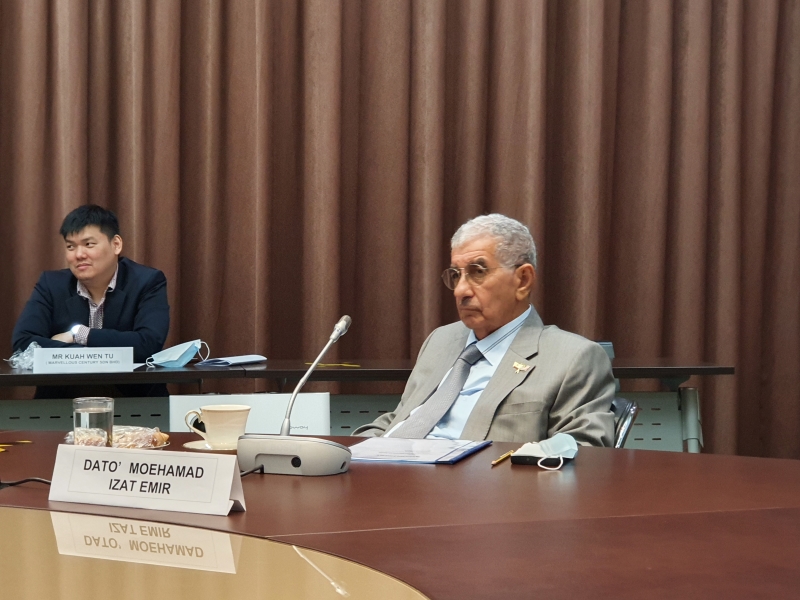
(left) Mr Kuah Wen Tu and (right) Dato’ Moehamad Izat bin Achmad Habechi Emir
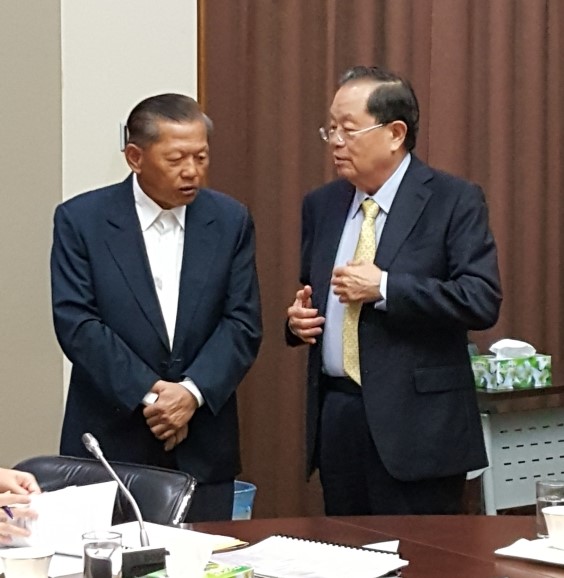
(right) Tan Sri Datuk Tee Hock Seng, JP having a discussion with (left) Dato’ Kuah Lai Huat
(2) 28 July 2020
– Webinar on “How Drones are Changing the
Business World”
The Selangor Human Resources Development Centre in partnership with Drone Academy Asia, Malaysia South-South Association (MASSA) and Malaysia-Japan Economic Association (MAJECA) hosted a webinar which was attended by various members from MASSA and MAJECA. MASSA and MAJECA was represented by Ms Ng Su Fun, Executive Secretary of MASSA and MAJECA.
The title of the webinar – ‘How Drones are Changing the Business World’, was directed at increasing awareness about the potential benefits of using drone technology to aid business to achieve sustainability and weathering the ‘new normal’.
34 participants from members of MASSA and MAJECA together with MITI, USM, SIRIM, MPOB, MIGHT, MIMOS as well as representatives from Bangladesh-Malaysia Chamber of Commerce & Industry (BMCCI) and JAGAM members attended the webinar.
The Speakers at the webinar were:
1) Mr. Alvin Tan, Manager from the Drone Academy Asia
2) Mr. Ken Khoo, Head of Marketing from Poladrone
Ms Ng Su Fun, Executive Secretary of MASSA gave a Welcome Address at the start of the webinar.
Ms Ng Su Fun, Executive Secretary of MASSA giving the Welcome Address at the webinar
The presentation of Mr Alvin Tan, Manager of Drone Academy Asia, an enterprise drones training academy centred on the webinar’s theme. He is a firm believer in the usage of drones and is enthusiastic in the capabilities and application of drones in the 21st century and aims to co-develop and deliver drone course modules that empower participants to implement them into their workflow for greater efficiency and safety practices.

Mr Alvin Tan, Manager of Drone Academy Asia sharing on the commercial applications of drone technology
Mr Ken Khoo, Head of Marketing from Poladrone, an all-in-one drone solutions provider spoke about ‘Sustainability & Saving Lives: Drone in the New Normal”. Poladrone’s goal is to create greater awareness and conversations about the ways drones can be used to enrich our everyday lives, both personally & professionally.

Mr Ken Khoo, Head of Marketing of Poladrone, giving his presentation on the role of drones, and how they enable sustainable industrial workflows

(from top left, clockwise) Mr Ken Khoo – Poladrone, Mr Alvin Tan – Drone Academy Asia, Ms Khoo Yi Lin – SHRDC, Ms Erin Hoo – Drone Academy Asia and, Ms Ng Su Fun – representing MASSA and MAJECA
(3) 26 August 2020 – Webinar on Cloud Computing:
“The Best Time to Leverage on Cloud Technology:
Take Your Business to Greater Heights”
Malaysia South-South Association (MASSA) in collaboration with Malaysia-Japan Economic Association (MAJECA), Alphaus Cloud and Malaysia Digital Economy Corporation (MDEC) hosted a webinar on Cloud Computing which was attended by various members from MASSA and MAJECA. MASSA and MAJECA was represented by Ms Ng Su Fun, Executive Secretary of MASSA and MAJECA.
The webinar was entitled ‘The Best Time to Leverage on Cloud Technology: Take Your Business to Greater Heights’. This non-technical webinar aimed to equip decision-makers to use cloud technology for their business growth by optimizing the technology to their needs.
The Speakers at the webinar were:
1.Mr Mohd Atasha Alias, Director of Alphaus Cloud Sdn Bhd
2.Mr Tan Tze Meng, Head of Cloud and Data Centers at MDEC
Ms Ng Su Fun, Executive Secretary of MASSA gave a Welcome Address at the start of the webinar.
Ms Ng Su Fun, Executive Secretary of MASSA giving the Welcome Address at the webinar
Mr Mohd Atasha Alias, Director of Alphaus Cloud, a leading software provider of Cloud Cost Management in Japan was invited to speak. Alphaus Cloud Sdn Bhd is a company founded in Malaysia, and it is from this business base that it is expanding across the Asia Pacific. He advises business leaders on how to thrive in the Digital Era, and helps business transform digitally from ‘brick and mortar’ to ‘click and mortar’ by leveraging his myriad connections along the digital value-chain of tools and services.
Mr Atasha’s presentation centred on answering the question – ‘What is Cloud’, and he also argued for cloud’s adoption as part of the new entrepreneurial mindset.
Mr Mohd Atasha Alias, Director of Alphaus Cloud introducing cloud technology and arguing the case for adopting it
The second speaker was Mr Tan Tze Meng. He presented the comparison of advantages using Cloud technology vs. on-premise infrastructure and the total cost of ownership for decision-makers.
Mr Tan has been in the IT industry since 1986, and has an extensive portfolio in this field. His beginnings can be traced to his time at Telekom Malaysia, where he played a key role in launching TMNet in 1996. Mr Tan is the Head of Cloud and Data Centers at MDEC. His department is responsible for the ecosystem development in the digital economy for Malaysia.
MDEC’s Head of Cloud and Data Centers, Mr Tan Tze Meng’s case for adopting cloud technology by presenting the comparisons of the total cost of ownership for an IT project using cloud technology versus on-premise infrastructure
After the presentations, the webinar held a series of polls, followed by a Q&A session moderated by Ms Rishanty Navaratnam of Alphaus Cloud.
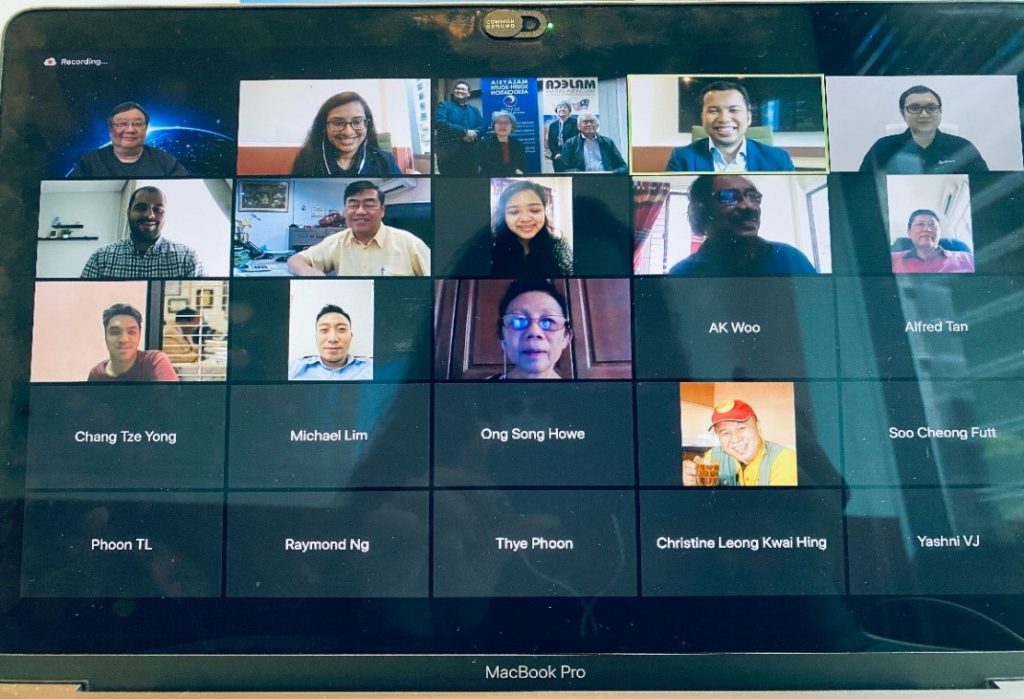
To cap off the webinar, a virtual group photo session was held with the Speakers, the webinar’s team and the audience
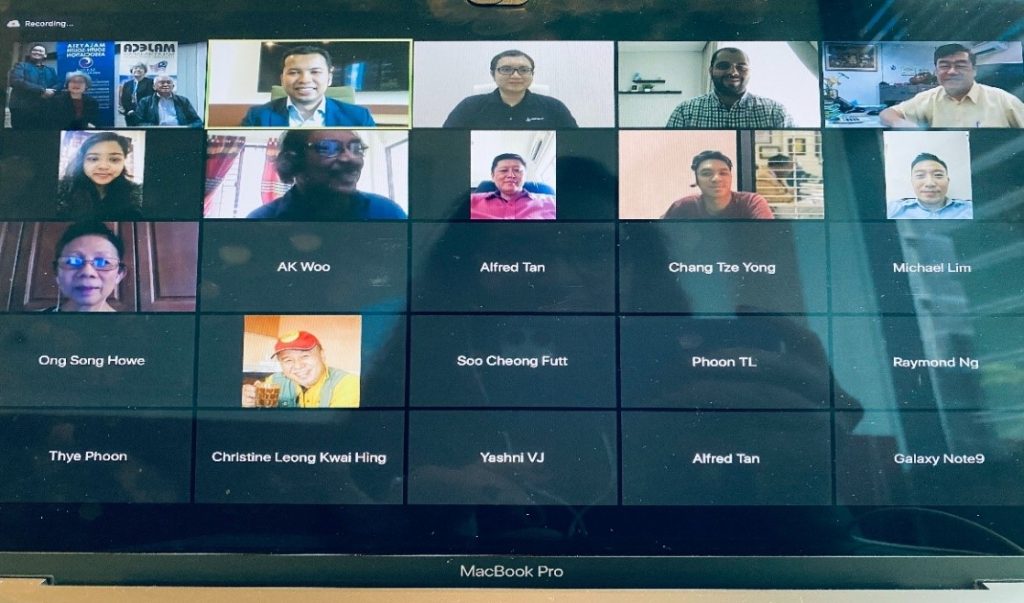
Group photos of participants

The webinar’s team (from left to right) Mr Mohd Atasha Alias – Alphaus Cloud, the MASSA-MAJECA team, Ms Rishanty Navaratnam – Alphaus Cloud and Mr Tan Tze Meng – MDEC
MARDI Essential Oil Distillation Systems: A Large-Scale Extraction Technology For Producing Flavour And Fragrance Materials
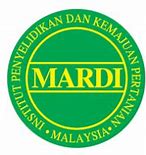
Article by:
Dr. Norma Hussin
Senior Research Officer
IC – Industrial Crop Research Centre
MARDI Headquarters
The Essential Oils

Essential Oil
Most of the aromatic crops contain aroma subtances in the plant cells and, its normally known as essential oil. These aroma materials can be derived from plants and animal parts that have been used since many decades by global flavour and fragrance (F&F) industries to produce flavours, essential oils, concretes, absolutes and perfume materials. Essential oils are the famous ancient materials especially for producing perfumery, medicines and aroma materials; and starting in year 1930, a new era of aroma chemical material is manufactured, synthesized and fractionated from aromatic substances. Nowadays, essential oils are very important in our life-styles and wellness; and most of the essential oils can be used as value added in the F&F blending as speciality aroma in foods, beverages, confectioneries, traditional medicines, nutraceuticals, cosmeceuticals and even pharmaceuticals.
Essential Oil Notes as an Arts of Perfumery Blending
Perfumery is an art of blending; it is a combination of aroma notes known as top, middle and base notes (Table 1).
Table 1. Natural aroma materials and note classifications
|
Essential Oils/ Aroma Materials |
Perfumery Notes |
| Limes | Top notes |
| Oranges | Top notes |
| Citronella | Top notes |
| Ylang-ylang | Middle notes |
| Roses | Middle notes |
| Jasmine | Middle notes |
| Patchouli | Base notes |
| Sandalwood | Base notes |
| Vertiver | Base notes |
| Agarwoods | Base notes |
Most of the citrus materials presenting a high aromatic essential oil that are classified as top notes. Meanwhile floral materials presenting a mild aroma volatile and classified as base notes. A long-lasting aroma material that can contribute for a long-lasting aroma with a characterising of deep, strong balsamic and woody are commonly contributed by woods and some leafy parts. They are usually produced by agarwoods, sandalwoods, cedarwoods, patchouli and vertivers and having a strong perfumery note as base notes. Patchouli is a base note and act as fixative material in the perfumery. Natural and aromatherapy perfumes can be formulated and designed by perfumers by combinations of these three notes (base, middle and top notes) with a master skill to present a harmony aromatic perfumes or aromatherapy blending.
Patchouli Essential Oil
In Malaysia the most unique and valuable aromatic crops are Patchouli, locally known as Nilam. Dried patchouli plants are traditionally used in the past by Malaysian and Indonesian to protect batik or clothes in the cabinets from insects besides giving aroma to the clothes. The Patchouli is an aromatic herb contains essential oil and having a very unique and natural aromatic derived from its essential oil substances. Patchouli essential oil (PEO) is one of the most popular perfumery materials and perform high demand in world-wide trades as fixative materials for fragrance and cosmetic formulations. PEO is very unique and its chemical components cannot be synthesized. PEO is suitable for a masculine perfumery ingredient and possesses a fixative material in the perfumery blending. Patchouli has been suggested by Malaysian Agricultural Research and Development Institute (MARDI) for farmers and entrepreneur programmes due to its essential oil is highly expensive and high demand in global for flavour and fragrance (F&F) industries.
Helping Farmers and Industries
Malaysia is currently focused in planting aromatic crops for helping farmers and industries for these new sectors of manufacturing of flavour and fragrance (F&F) products. However, the cost of productions is higher than Indonesian and Thailand essential oils. In this case, some affords are focused for business plans such as conducting courses and training several farmers, entrepreneurs and industries in producing essential oil base products such as aromatherapy, soap, bath gel, shampoo, cosmetics, perfumery and insect repellent products.
Essential Oil Plants
In Malaysia, essential oil distillers are locally built for specific industrial production needs and specialty ingredients. In Table 2, some of the distiller type and location of essential oil distillers are scattered in Malaysia. Besides distillers, there are many types of high-tech systems are set-up for processing aromatic extracts that can be found in MARDI, FRIM, universities and private companies such as fractionation systems (molecular distillations), agarwood conventional distillers, vanilla extractors, sub-critical gas extractors, and supercritical CO2 extractors found in Malaysia.
Table 2. Lists of Essential Oil distiller and Extractor in Malaysia
| Distiller type | Locations | Essential oil/aroma materials/extracts |
| Steam distillation | MARDI Station at Kuala Linggi, equipped with 10 units of 100L Industrial scale and a batch type hydro-distillation of 100L scale. | Various aromatic crops(1) |
| Steam and hydrodistillation units | MARDI Headquarters Serdang, equipped with 2 units of 300L Industrial scales and a batch type hydro-distillation of 100L scale. | Various aromatic crops(1) |
| Hydrodistillation | Industrial crop research centre, MARDI Serdang Selangor | Agarwoods, leafy and floral types |
| Steam distillation | Forest Research Institutes Malaysia, FRIM | Various aromatic crops |
| Steam distillation | Universities (IBD-UTM, UMP and other universities) | Various aromatic crops |
| Distillation | Melaka Biotech, Melaka | Various aromatic crops |
| Hydrodistillation | Kedai Agarwood Sdn. Bhd. Pahang equipped with 10 rounded semi-vessels of 12L hydrodistillation system. | Agarwoods |
| KKTM, Lenggong, Perak | A modern distillation system | Various aromatic crops |
MARDI Industrial Scale Essential Oil Distiller


A local essential oils
The local essential oils are produced using an industrial scale steam distiller system (Essential oil incubator) located at MARDI Station Kuala Linggi, Masjid Tanah Melaka, Malaysia. A Standard Operation Procedures (SOP) for essential oil productions of Patchouli (Nilam), Lemongrass (Serai makan), Citronellal (Serai wangi), Cinnamon (Kayu manis), Lemon myrtle, Kaffir Lime (Limau purut), Kasturi lime (Limau Kasturi) and other aromatic crops are successfully established by MARDI (See Table 3).
Table 3.
List of the essential oils and aroma materials produced by MARDI
| Essential oil (1) | Selected Aroma Marker | Perfumery notes |
| Cinnamon leaf oil | Cinnamic aldehyde, Eugenol | Middle note |
| Citronella oil | Citronellal and Geraniol | Top note |
| Lemongrass oil | Citrals (Neral and Gernial) | Top note |
| Ylang-ylang oil (a) | Linalool | Middle note |
| Jasmine (b) | Linalool | Middle note |
| Gaharu (c) | Sesquiterpenes (Agarospirols, hinesols etc.) | Base note |
| Lemon myrtle | Citrals(Neral and Gernial) | Top note |
| Kaffir lime | Citronellal and limonene | Top note |
| Nilam (Patchouli) | Patchouli alcohol and other sesquiterpenes | Base note |
a Distillation process using a10L aluminium distillation vessel (lab scale)
b Concrete and absolute materials (lab scale)
c Essential oils and resinoids (lab scale)
Citronella, Nilam and Lemon myrtle (as speciality industrial crops) are the most popular crops and farmers should be followed the Standard Operation Procedures (SOP) as recommended by MARDI.
Essential Oil Products

Essential Oil Products
Essential oils can be added as natural fragrance materials into several wellness, Spa and food products as follows:
a. Blended aromatherapy,
b. Aromatherapy perfumes,
c. Fine fragrances,
d. Soap,
e. Bath gel,
f. Shampoos,
g. Massage and Spa Products,
h. Cosmetics,
i. Insect repellent,
j. Foods and Beverages, and
k. Confectioneries




MARDI Headquarters
Malaysian Agricultural Research and Development Institute (MARDI)
MARDI Headquarters
Persiaran MARDI-UPM
43400 Serdang
Selangor
Tel: +603-8953 6000
Fax: +603-8953 6011
Email: enquiry@mardi.gov.my
Website: www.mardi.gov.my
Contact of Dr. Norma Hussin
Senior Research Officer
IC – Industrial Crop Research Centre
MARDI Headquarters
Tel: +603-8953 6000 Ext. 6234
Email: normahus@mardi.gov.my
News
2019-2020 Annual Report
- President’s Statement
- Message from The Ministry of International Trade and Industry (MITI) Malaysia
- Message from The Ministry of Foreign Affairs, Malaysia
- Message from Malaysia External Trade Development Corporation (MATRADE)
- Message from Malaysian Investment Development Authority (MIDA)
- Diary of Events
MARDI Young Agropreneur Programme

Article by:
Encik Abu Bakr Mohd Hanim
Deputy Director
Young Agropreneur Programme
Technology Transfer & Entrepreneur Development Centre
MARDI Headquarters
The Young Agropreneur Unit was specifically created by the Ministry of Agriculture & Food Industry (MAFI) in 2013, for all Malaysians aged between 18 to 40 years old. The approach of this unit is to facilitate and encourage higher involvement of youth in Agriculture-based entrepreneurship including all activities within the agriculture industry value chain such as crops and food processing (agro-based industry) including marketing and technical advice.
MARDI Young Agropreneur Programme was established in 2014 to plan, organize and administer activities that foster the utilization of technology and innovation among the agropreneurs specifically on crops and food processing (Agro-based Industry). The main objective of this programme is to change the perception and encourage the involvement of youth (aged between 18-40 years old) in agriculture and agro-based industries that would create entrepreneurs to be actively involved in agro-based business. This is done through various structured programs like developing participants through training guidance and consultation as well as packaged technical, financial, and marketing support. The vision of this programme is to develop youth agropreneurs who are progressive, competitive, creative, innovative and ultimately will generate high income from their ventures.
During the five years of the RMK-11 (2016-2020), a total of 5,688 participants were successfully registered under MARDI Young Agropreneur Programme via online and manual registration. However, by 2019, manual registration was no longer accepted, and all interested parties must register their application via online at MARDI’s Young Agropreneur website.
MARDI’s Young Agropreneur Programme focuses on the three main clusters for development of young entrepreneur namely agro-based industry (IAT), crops and livestock. However, other clusters such as marketing and services are still being accepted and categorized as other clusters. Based on the records, IAT cluster were the most registered cluster in this programme with a total of 2,757 participants (2016; 584, 2017; 982, 2018; 410, 2019; 463 and until end of June 2020 with 318 applicants). The crops cluster had a total of 1,796 registrations (2016; 287, 2017; 659, 2018; 423, 2019; 280 and until June 2020 with 147) while livestock cluster received 988 registration (2016; 344, 2017; 394, 2018; 178, 2019; 71, and until end of June 2020 with 1 applicant. Finally, for the other clusters only 147 applicants were recorded (2016; 0, 2017; 53, 2018; 80, 2019; 13, 2020;1).
One-off technical advisory services are one of the mediums for MARDI technology transfer to the young entrepreneurs and future entrepreneurs. Some of the communication methods used in these services include face to face appointments with guidance officers, telephone calls, communication application such as WhatsApp and email. For walk-in or appointment meeting, one can visit the Technology Transfer and Entrepreneur Development Centre at MARDI Headquarters or the nearest State MARDI Office. One of the benefits from one-off advisory services is the free consultation session given by the guidance officer. The consultation will help to resolve any issues related to the product or project faced by the entrepreneur. The Guidance Officer will also assist in recommending appropriate training or courses to the entrepreneurs based on their products. As stated during the RMK-11 (2016 to 2020), 6,534 advisory sessions were provided by MARDI officials to young agropreneurs and future entrepreneurs throughout Malaysia.
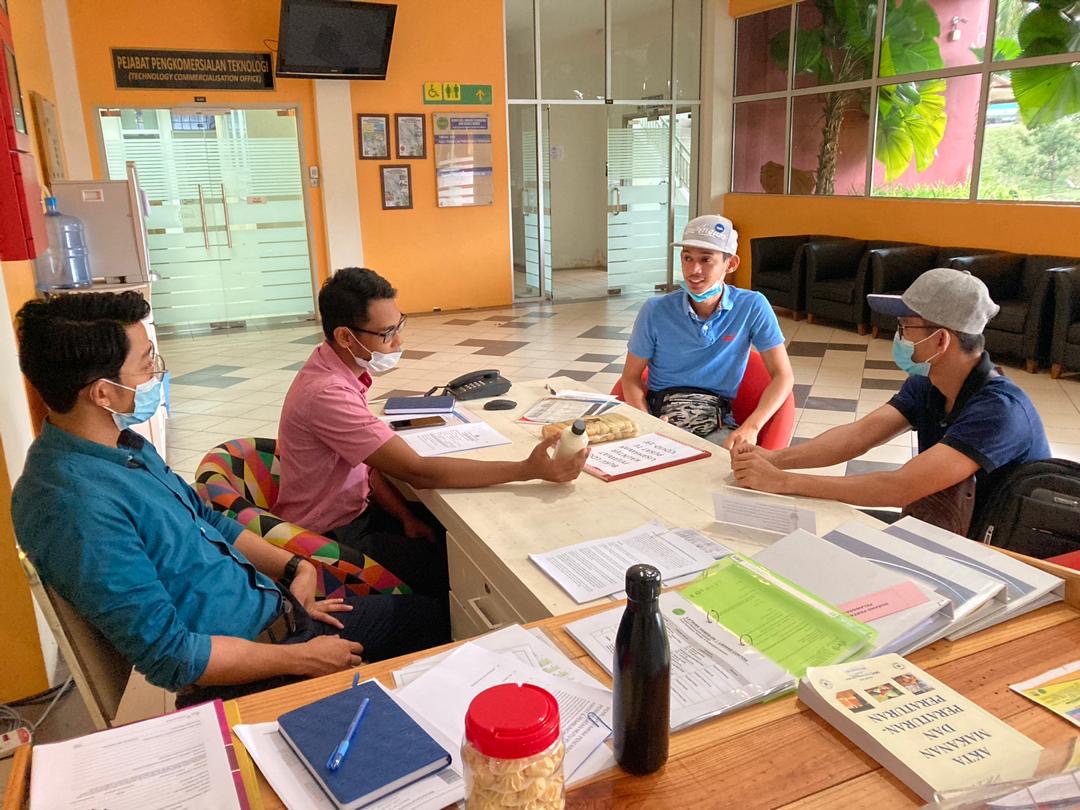
Consultation with young entrepreneur
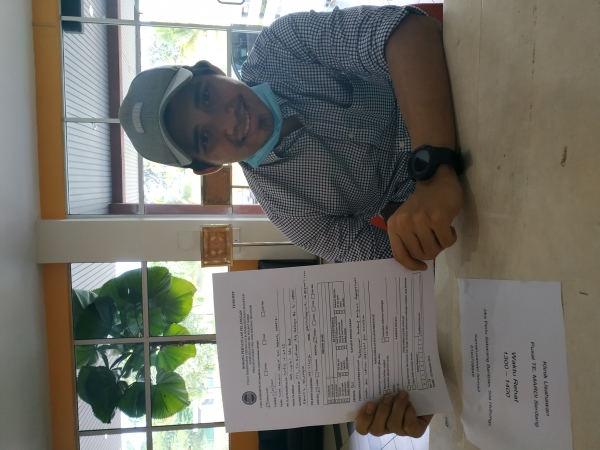
Consultation Form
The SOP of processing applicant registration has been developed. Applications received through online registration will be processed within 2 weeks. Eligibility filtering process will be done to ensure that only eligible applicants are accepted as participants. The main criteria assessed were Malaysian citizenship and age qualification of between 18 to 40 years old. If the application does not meet the specified criteria, the application will be rejected. Youths who have successfully registered as young agropreneurs will be called as ‘Peserta AM’ and will be informed through email with acceptance letter. Registered participants are considered as successful and entitle as ‘Usahawan AM’ when they meet the requirements set by this programme such as they have attended technical courses by MARDI, received AM grants and managed to increase their income from their businesses or crops.
Thereafter, participants will be given access to MARDI entrepreneurship training namely AGORA and various other technical training. Moreover, MARDI will also be providing technical advice services from the experts and execute continuous monitoring for MARDI Young Agropreneur businesses. MARDI’s Young Agropreneurs will also be given an opportunity to apply for Young Agropreneur Grant from MAFI with maximum value of RM20,000. Guidance officer will guide participants for this purpose. Besides, eligible participant will be offered business loan with low interest from Agrobank and TEKUN.
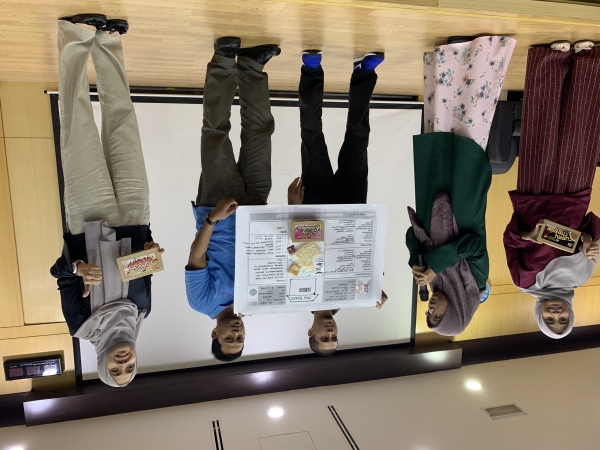
A group of AGORA participants presenting their Business Model Canvas (BMC) layout
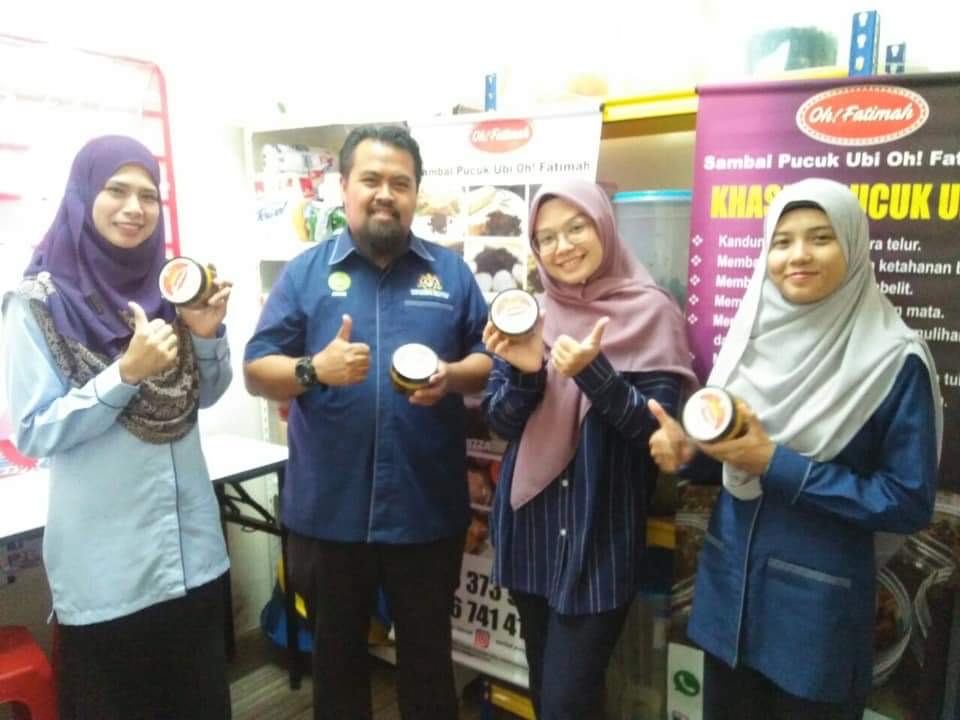
Technical visit to entrepreneur’s premise
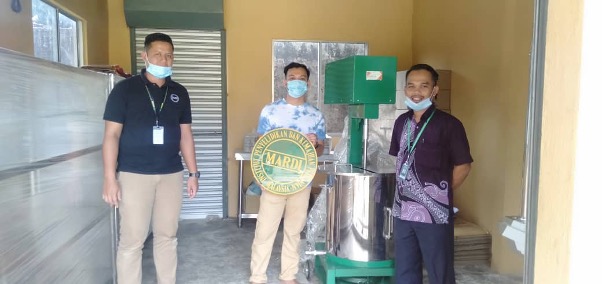
Acceptance of the equipment by grant recipient
In conclusion, registered youth agropreneur with MARDI will receive various benefits including courses or training, grants, and guidance such as technical advice from experts in government agencies. In that regard, young agropreneurs’ income can be enhanced through improvement of productivity, quality, technology and innovation with a competitive market. This sustainable programme will feature many more agro-based millionaire and make the local agricultural industry as a future field of business that generates momentum in line with the country’s Agrofood Policies. The Young Agropreneur Graduate is MARDI’s Young Agropreneur who has already successfully achieved Young Agropreneur status and met the MARDI’s Guided Entrepreneur criteria and has succeeded in becoming one of them. Guided Entrepreneur is the next level programme of entrepreneur development in MARDI. The selection of the graduates is based on the increment of income level, managed to have a valid premises or farm, and showing good business performance for at least one year by earning over RM10,000 per month.
MARDI Headquarters
Malaysian Agricultural Research and Development Institute (MARDI)
MARDI Headquarters
Persiaran MARDI-UPM
43400 Serdang
Selangor
Tel: +603-8953 6000
Fax: +603-8953 6011
Email: enquiry@mardi.gov.my
Website: www.mardi.gov.my
Contact Person on the Young Agropreneur Programme
Encik Abu Bakr Mohd Hanim
Deputy Director
Young Agropreneur Programme
Technology Transfer & Entrepreneur Development Centre
Tel: +603-8953 6801
Fax: +603-8953 6770
Email: abubakr@mardi.gov.my
Website: https://agropreneurmuda.wixsite.com/ammardi
Country Feature: Colombia
Country Feature: Colombia

Colombia Flag

Bogota, Capital of Colombia
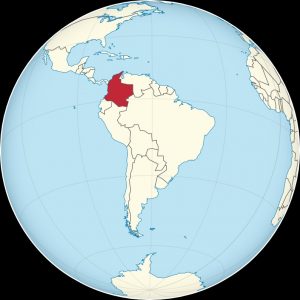
Colombia is located at the northeastern of the South America continent
Colombia heavily depends on energy and mining exports, making it vulnerable to fluctuations in commodity prices. Colombia is Latin America’s fourth largest oil producer and the world’s fourth largest coal producer, third largest coffee exporter, and second largest cut flowers exporter. Colombia’s economic development is hampered by inadequate infrastructure, poverty, narcotrafficking, and an uncertain security situation, in addition to dependence on primary commodities (goods that have little value-added from processing or labour inputs). (Source: CIA World Factbook, Colombia.) The Republic of Colombia is the third most populous country in Latin America. The nation is considered a middle power in international affairs, being the only NATO Global Partner in its region, and is a member of various major international organisations including the OECD, the UN, the WTO, the OAS, the Pacific Alliance and others. |
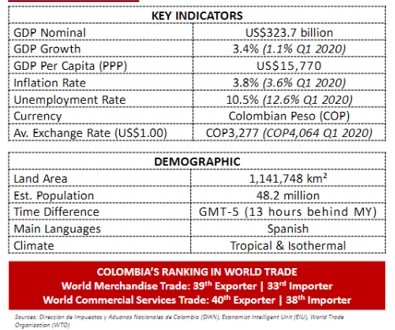
(Source: MATRADE Webinar, Bilateral Trade between Malaysia & Colombia on 13 July 2020)

(Source: The Observatory of Economic Complexity (OEC)

(Source: The Observatory of Economic Complexity (OEC)
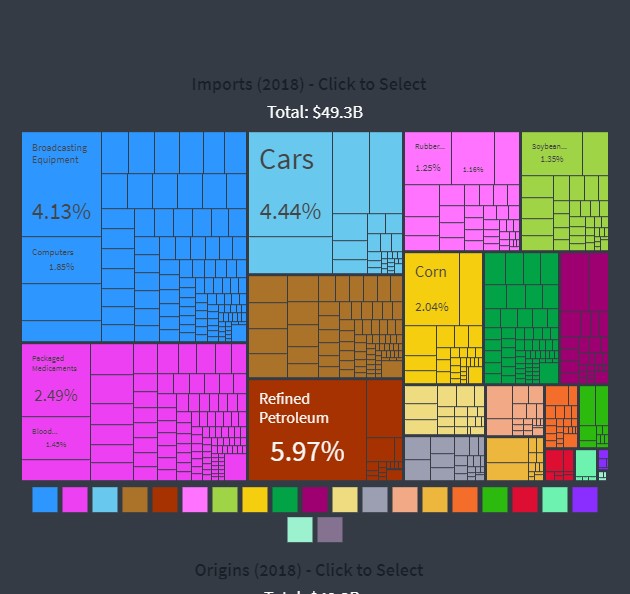
(Source: The Observatory of Economic Complexity (OEC)

(Source: MATRADE Webinar, Bilateral Trade between Malaysia & Colombia on 13 July 2020)

| Top Export | (%) | Top Import | (%) |
| Coffee, Tea Mate, and Spices | 67 | Others | 27 |
| Others | 11 | Electrical Machinery and Equipment and Parts | 22 |
| Copper and Articles Thereof | 7 | Rubber and Articles Thereof | 15 |
| Aluminium and Articles Thereof | Iron and Steel | ||
| Miscellaneous Edible Preparations | 5 | Optical, Photographic, Cinematographic, Measuring, Checking, Precision, Medical or Surgical Instruments and Apparatus; Parts and Accessories Thereof | 11 |
| Plastics and Articles Thereof | 3 | Nuclear Reactors, Boilers, Machinery and Mech Appliances | 10 |
(Source: MATRADE Webinar, Bilateral Trade between Malaysia & Colombia on 13 July 2020)
Outlook
(1) Colombia has a track record of prudent macroeconomic and fiscal management, and despite economic downturns has maintained its investment grade rating since 2013. Growth was on track to accelerate further in 2020, but the COVID-19 pandemic is expected to significantly affect private consumption and investment (Source: The World Bank, April 2020, Colombia Overview).
(2) Colombia’s government has implemented early emergency response measures – declared a State of Emergency, closed the country’s borders, and imposed a mandatory quarantine. The Government also announced a sizable fiscal stimulus package (COP 14.8 trillion or 1.4% of GDP, with potential to increase to up to 48 trillion) that would provide additional resources for the health system, special lines of credit for businesses in certain sectors, and increased transfers for vulnerable groups. The central bank reduced its intervention rate by 50 basis points on March 27 and introduced a broad range of measures to increase liquidity (Source: The World Bank, April 2020, Colombia Overview).
(3) Colombia continues to maintain a solid macroeconomic framework. Key components of Colombia’s macroeconomic framework include the adoption of a full-fledged inflation-targeting regime, a flexible exchange rate, a Fiscal Rule (2011) for the central government, and a Medium-Term Fiscal Framework (Source: The World Bank, April 2020, Colombia Overview).
(4) Findings (Source: MATRADE Webinar, Bilateral Trade between Malaysia & Colombia 13 July 2020; MATRADE Webinar, Market Update – Colombia Business Scenario During Covid-19 and the Way Forward.):
a. Colombia is sourcing for alternative imports, instead of relying on traditional markets i.e. America and China.
b. Colombia is offering import flexibilities:
i. duty-free tariffs for health products, medicines, medical equipment, non-textile gloves, and protective clothing etc.
ii. no health registration (INVIMA) required for antibacterial gel and disinfecting topical solution.
c. Increase in e-Commerce business activities.
d. Surge in Digitization: online messaging and digital home services increased by 28%.

(Source: MATRADE Webinar, Bilateral Trade between Malaysia & Colombia on 13 July 2020)

(Source: MATRADE Webinar, Bilateral Trade between Malaysia & Colombia on 13 July 2020)

(Source: MATRADE Webinar, Market Update – Colombia Business Scenario During Covid-19 and the Way Forward)

(Source: MATRADE Webinar, Bilateral Trade between Malaysia & Colombia on 13 July 2020)
Sources
1. CIA World Factbook, South America: Colombia, retrieved from https://www.cia.gov/library/publications/the-world-factbook/geos/co.html.
2. MATRADE Webinar, Bilateral Trade between Malaysia & Colombia on 13 July 2020.
3. MATRADE Webinar, Market Update – Colombia Business Scenario During Covid-19 and the Way Forward.
4. Observatory of Economic Complexity (OEC), Colombia, retrieved from https://oec.world/en/profile/country/col/.
5. The Colombian Government Trade Bureau, retrieved from https://coltrade.org/contact/aboutthebureau.asp.
6. The World Bank, April 2020, Colombia Overview, retrieved from https://www.worldbank.org/en/country/colombia.
7. The World Bank, Colombia At-A-Glance, retrieved from https://www.worldbank.org/en/country/colombia.
Embassy of the Republic Colombia in Malaysia
H.E. Mauricio Gonzalez Lopez
Ambassador Extraordinary and Plenipotentiary
Business Suite 19A-27-3A
Level 27, UOA Centre
No. 19, Jalan Pinang
50450 Kuala Lumpur
Tel: +603-2164 5488 / 5489
Fax: +603-2164 5487
Email: ekualalumpur@cancilleria.gov.co
Website: http://malasia.embajada.gov.co/
Editorial
Greetings from MASSA !
We have passed 1H2020. Covid-9 pandemic disrupted the economies of many countries, including Malaysia. It has been an eventful 2020 thus far. Bank Negara’s latest report confirmed Malaysia has gone past its worst, registering a contraction of 17.1% in 2Q2020 (1Q2020: 0.7%). While we grapple to rebuild our respective businesses we must continue to remain vigilant and adhere to the SOPs to prevent COVID-19 from viralling up again.
The Movement Control Order (MCO) in 2Q2020 “locked down” many businesses but we have witnessed the agility of some sectors of our economy that have quickly innovated to stay in business and remain competitive. Computers, automation, data processing and the development of business apps have led the change towards a seamless, safe and cashless way to transact and do business. Hence, the inertia to “go-digital” has become a compelling push factor. In view of this, MASSA hopes to bring to members attention, events and programmes that can be informative and useful to help you and your business in your journey to go “digital”.
In this newsletter, we report on 2 webinars organised by MASSA together with partners in the industry. They were (1) How Drones are changing the Business World and (2) The best time to leverage on Cloud Technology: Take your business to greater heights. Do take time to listen to the webinars posted in this edition of our newsletter.
We thank MARDI for contributing their informative articles on “MARDI Young Agropreneur Programme” and “MARDI Essential Oil Distillation Systems: A Large-Scale Extraction Technology For Producing Flavour and Fragrance Materials” and look forward to working with your organisation on upcoming programmes.
MATRADE organized a webinar on “Market Update on Colombia”. We have captured some salient points and issues for member’s consideration as they seek to expand the market reach for their products and services.
MASSA will endeavour to line-up more events this year so that members can stay connected and be updated on developments for the digital future.
We wish all members and readers, to stay safe and keep well in these Covid-19 days.
Thank you.
Ng Su Fun
Editorial MASSA
President’s Message
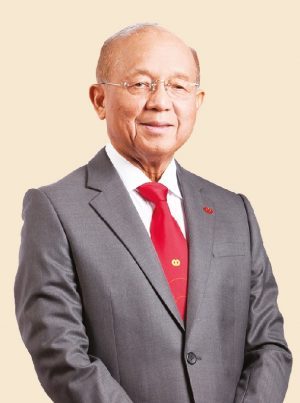
Tan Sri Azman Hashim
President MASSA
Bank Negara Malaysia recently released its 2Q20 report wherein the Malaysian economy registered a contraction of 17.1% (1Q2020: 0.7%). This decline is a reflection of the unprecedented impact of the stringent containment measures taken by our Government vide the Movement Control Order (MCO) to control COVID-19 pandemic which took effect on 18 March 2020. This created demand and supply shocks. As COVID-19 pandemic impacted many other nations around the globe, external demand conditions weakened substantially and production constraints and gaps became evident.
Our Government’s quick response, with a sizable fiscal stimulus package in a few tranches targeting a wide spectrum of the rakyat, was able to support the gradual easing of movement restrictions that helped to kick-start the economy again from as early as May 2020.
Barring further unforeseen risks, the Malaysian economy is expected to begin to recover gradually in the 2H2020 as the economy progressively re-opens and external demand improves. However, the outlook will continue to face on-going uncertainties from low global oil and commodity prices and US-China trade tensions as the impacts from COVID-19 pandemic continue to linger.
The pandemic accelerated the push for businesses to find new ways to stay afloat and to reach customers and it became evident that “going digital” would be the way forward. As we navigate this crisis, we will have to adapt to the new operating landscape to ensure our respective businesses can continue with a “people-first, health and safety” mindset.
MASSA held its 29th Annual General Meeting (AGM) on 29th June 2020. The current EXCO members continue to serve the 2nd year of the term 2019/2021. My gratitude and appreciation to my fellow colleagues in the MASSA Executive Committee for your continuing support. Thank you also to MASSA members for your participation in the activities of the Association.
Stay safe.
Tan Sri Azman Hashim
President
MASSA
Mulpha International Bhd

| Mulpha International Bhd (Co. No. 19764-T) |
| About Us: | Mulpha invests in the real estate, hospitality and education sectors. The Group is committed to long-term value creation with its focus on high-end property development and investment, education, retirement and healthcare. It invests in some of the fastest-growing and most vibrant economies in the region, including Malaysia, Australia, United Kingdom and New Zealand.
Mulpha is the developer of the award winning 1,765-acre Leisure Farm in Iskandar Malaysia. Assets in Australia include the world renowned, resort-styled Sanctuary Cove on the Gold Coast; Norwest Business Park, Sydney; InterContinental Sydney Hotel and Transport House, Sydney. Mulpha also holds a strategic stake in Aveo Group, Australia’s largest owner, operator and manager of retirement communities which is listed on the Australian Stock Exchange. Mulpha also has a strategic investment in the London Marriott Hotel Grosvenor Square, a landmark hotel in the heart of London’s Mayfair district. |
||||||||||||||||||||||||||||||||||||||||||
| What We Buy: | – | ||||||||||||||||||||||||||||||||||||||||||
| What We Sell: |
|
||||||||||||||||||||||||||||||||||||||||||
| Contact: | Angelyn Lee (Company Secretary) / Yvonne Ng (Executive Asst) | ||||||||||||||||||||||||||||||||||||||||||
| Job Title: | – | ||||||||||||||||||||||||||||||||||||||||||
| Location: | PH1, Menara Mudajaya, No. 12A, Jalan PJU 7/3, Mutiara Damansara, 47810 Petaling Jaya, Selangor |
||||||||||||||||||||||||||||||||||||||||||
| Tel/Fax No: | Tel : 03 – 7718 6288 Fax : 03 – 7718 6363 |
||||||||||||||||||||||||||||||||||||||||||
| Industry: | Property & Real Estate | ||||||||||||||||||||||||||||||||||||||||||
| Email: | enquiry@mulpha.com.my | ||||||||||||||||||||||||||||||||||||||||||
| Website: | www.mulpha.com.my | ||||||||||||||||||||||||||||||||||||||||||
